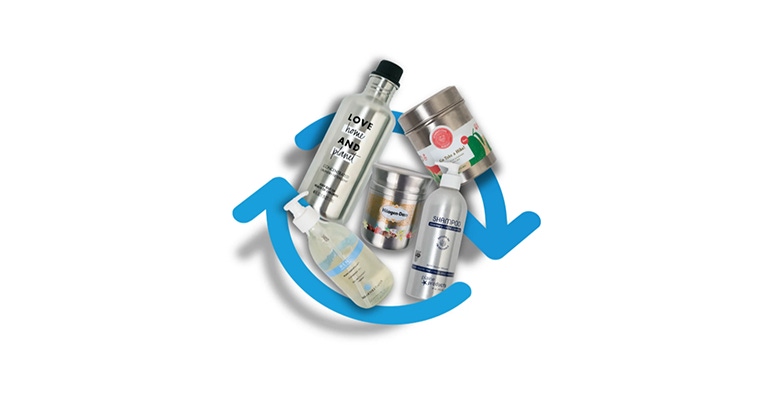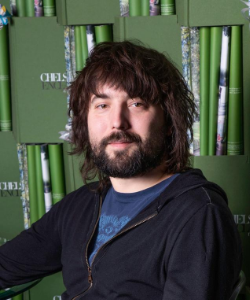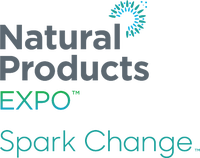TerraCycle CEO Tom Szaky unveils how retailers and brands can get involved with the important shift toward reusable packaging.

Reuse isn't just having a moment, it's a full-on movement. It's an exciting time for such a movement, too, according to TerraCycle CEO Tom Szaky. Loop, the subsidiary company of TerraCycle, is a fast-expanding leader in the space. It packages favorite everyday products—from shampoo to laundry detergent to ice cream—in zero-waste, beautifully designed containers. The delivery and return process is also waste-free; consumers receive all products in a reusable Loop Tote and schedule a free pickup in the same Tote. Or, customers can take used products to a designated drop-off location.
Loop has already partnered with big name retailers Kroger and Walgreens and natural products brands such as Seventh Generation and Nature's Path Organic alongside the likes of Clorox, Crest and Gillette. It's quickly gaining momentum, even with shifts amid COVID-19, and it's an opportune time for retailers and brands to take part.
What's the latest with Loop and how can retailers big and small get involved? Szaky reveals all below.
Has anything shifted with Loop in the last few months because of COVID-19?

Generally, the environmental movement as a movement should get and is getting tailwind because of COVID-19. It's the first time in modern history that we have taken the foot off the gas. We've never slowed down industry, and for the first time in history, we have for a meaningful period. Our impact on the environment has come into focus, and that's all giving tailwind to the environmental movement.
Now, that's very positive. [But] during COVID, people will value health and safety above environment. You could have a zero waste eco person still buy disposable face masks and throw them out or buy extra hand sanitizer and increase their waste because of where on their hierarchy of needs health and safety versus environment are.
There are two major ways that a consumer can experience reuse. Both have one thing in common—reusable package. One approach is the consumer does the refilling, and the other approach is the system does the refilling for the consumer. That's cleaning and refilling.
On the professional side [like Loop], there's actually been no negative effect. What it teaches us is that consumers are very focused on how something is cleaned, and that drives comfort. The only real negative we've seen is that some of our retail partners have delayed their in-store launches, which is the next phase of Loop journey, a few months here and there because they've been busy or other reasons, but mostly because of the strain on their system. They just needed more time. None of them have changed their commitment.
In terms of expansion or any programs that were started pre-COVID, are those still in progress?
In May of last year, we launched our testing platform in the U.S., Loopstore.com and our testing platform in France. The U.S. one is with Kroger and Walgreens, and the French one is with Carrefour. No effect on those. In fact, the U.S. one is expanding nationally. We just launched with Tesco in the U.K., and we're launching with Loblaws in Canada, Aeon in Japan and Woolworths in Australia and in Germany all before the middle of next year.
The next phase in Loop is it's available through the retailer online and in-store. Carrefour was the first to do that online in June, and then they're going to go in-store in October. Kroger is going in-store in Q1 and Walgreens is going in-store in Q2. And then a lot of the other retailers around the world are doing the same at different times next year.
As you've grown Loop, do you have interesting retail-related findings?
Consumers are looking for reuse. They're looking for more sustainable options. I don't think there's any new insight there, but what is a new insight is that they still value convenience above everything. A big learning for me is if you are going to be a brand or you are going to be a retailer that participates in or wants to do reuse, you have to really honor convenience as much as you would honor price. The three key things that consumers care about are convenience, price and features and benefits. Typically, everyone's been focused on price. And yes, that is very important, but there has been a lack of focus in the reuse movement on convenience.
What I've learned in Loop is that it's just as, if not more, important than price and to set the gold standard for that convenience. This should change, but the act of throwing out is the most convenient way to get something out of your home. That is what Loop really tries to focus on—to try to make it [a product] feel as disposable as possible. By doing that, convenience is not just on the retailer but can be extended to the convenience of a brand.
Are there any plans to expand programs like this to include smaller or independent retailers?
We have a lot in both retail and in brands. In brands, we are also working with a ton of startups in Loop—even companies that are one or two people.
There are two stages to getting on the platform. Step one is with the brand, or it could be with the retailer's label where we work with the brand to enable the reusable version of their product. Step two is to work with retailers to impregnate loop into their physical stores, and that can be done with small retailers or big retailers. That's really the key focus for how we go to distribution. If you think about this distribution step, there are three ways we do distribution in every country.
We start with what we call a standalone platform like Loopstore.com. That's good for learning, for testing, and there's always one of those per country. Then the really exciting part where small retailers or big ones work with us is as the integrator where we integrate into retailers' physical and digital stores. Sometimes the brand also owns the retailer like The Body Shop or Keihl's, and they do a DTC [direct to consumer]. The only difference there is if the brand is the retailer.


About the Author(s)
You May Also Like




